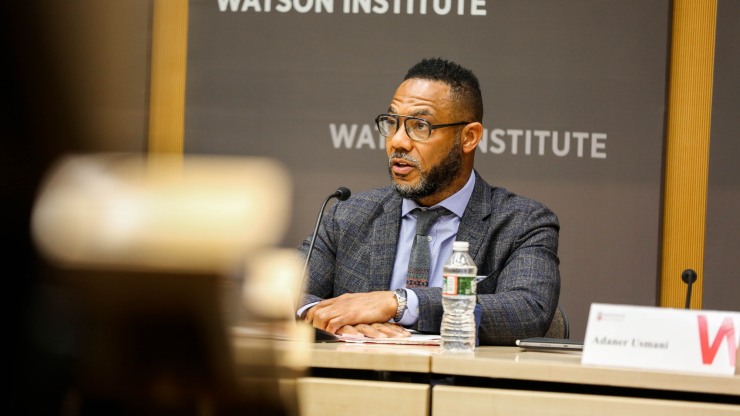
John Eason’s seminar gave 18 seniors the opportunity to collaborate with city officials in California, where they interviewed residents and explored ways to mitigate the negative economic impact of prison closure.
PROVIDENCE, R.I. [Brown University] — The city of Blythe, California, is facing a crisis: One of its two prisons, which employs more than 800 people, is expected to close in March 2025.
With so many jobs at stake, the closure is a “potential catastrophe” but can also be seen as “a real opportunity,” according to John Eason, an associate professor of sociology and international and public affairs at Brown University — and an opportunity that Brown students had the chance to help shape through their research and engagement.
In Eason’s Prison Abolition as Policy course, an undergraduate senior seminar at Brown’s Watson Institute for students concentrating in international and public affairs, 18 students had the opportunity to serve as policy advisors to city officials from Blythe and explore ways to mitigate the harmful effects of the prison closure and identify new opportunities the closure may create.
“Given the real-world implications of our findings and the nature of this project being a natural experiment as the town awaits closure in 2025, the learning space is incredibly dynamic and sometimes unpredictable,” said Eason, whose scholarship has explored community dynamics surrounding prison openings and closures, especially in rural communities where the local economy centers around them. “This provides the backdrop for an exciting, ever-changing learning experience.”
In collaboration with the Urban Institute’s Justice Policy Center and Office of Race and Equity Research, where Eason serves as a senior fellow, students in his Fall 2023 course dedicated the semester to conducting interviews with stakeholders in the city, analyzing that data and devising policy recommendations. The students presented their recommendations to the Blythe City Council — an exercise that served as their final exam.
Reflecting on the experience, students said the class offered an opportunity to conduct hands-on learning that added a new dimension to their studies at Brown.
One of the things that made Professor Eason’s seminar so unique was the opportunity to put into practice all the issues we typically only discuss in the classroom. Not only did we talk about how we get closer to a world without prisons, we strategized how to achieve decarceration responsibly in communities experiencing it.
SARAH OGUNDARE Class of 2024
“One of the things that made Professor Eason’s seminar so unique was the opportunity to put into practice all the issues we typically only discuss in the classroom,” senior Sarah Ogundare said. “Not only did we talk about how we get closer to a world without prisons, we strategized how to achieve decarceration responsibly in communities experiencing it.”
While the group focused on one specific city and prison, Blythe is anything but unique in facing the fallout from a prison closure. Between 1970 and 2000, the number of prison facilities in the U.S. tripled with more than 1,200 opening during the period. But since 2000, more prisons in the U.S. have closed than have opened, a trend that is expected to continue. While Eason and the class remained neutral on the question of whether this particular prison should close, he noted that some of the city’s most vociferous critics of the closure came from its large minority population.
“The fact that there are Black and brown people participating in social movements to keep prisons open is really interesting,” Eason said, as it runs counter to the narrative that people of color are strictly victims of the carceral system and overwhelmingly want to see them closed.
One-third of people working as correctional officers and working in prisons and jails are Black, he said.
“And those are pretty good jobs in terms of pay and benefits, especially compared to some of the alternatives,” Eason said. “So it’s a matter of finding better alternatives.”
Student Tyler Melwani said the course challenged his preconceived notions and approach to policymaking through real-world experience.
“Working with residents of Blythe deepened my understanding of the logistics of decarceration as I learned how marginalized, minority communities can depend on prisons economically and socially,” Melwani said. “We cannot eliminate the demand for prisons in the United States until we address the root causes of why communities like Blythe want prisons in their communities. It was fulfilling to cap off my international and public affairs concentration by partaking in a project with a significant real-world impact.”
This story was originally published by Brown University on February 27, 2024.